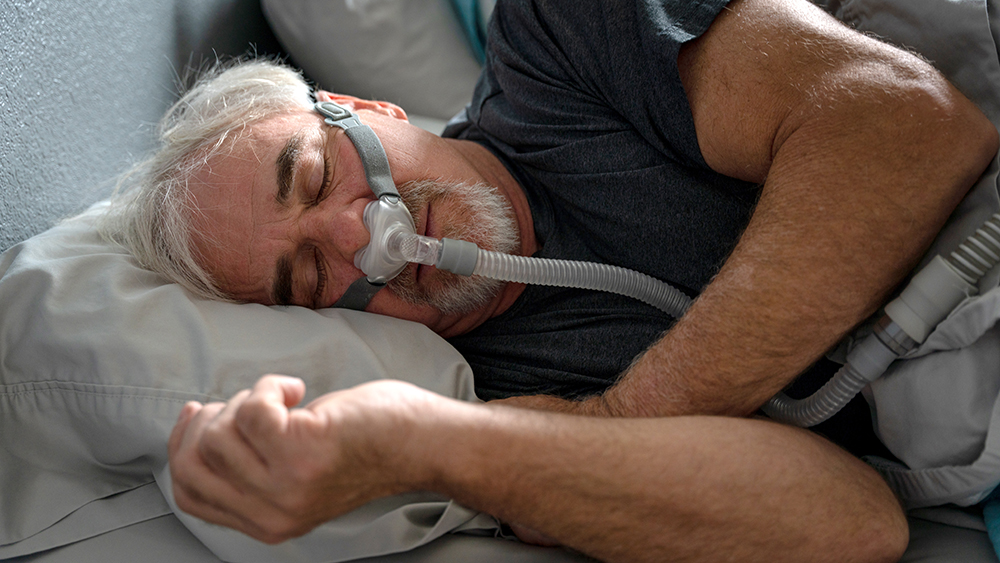
A study supported by the RECOVER Initiative found that people with obstructive sleep apnea were significantly more likely to develop symptoms of Long COVID.

A study supported by the RECOVER Initiative found that people with obstructive sleep apnea were significantly more likely to develop symptoms of Long COVID.
What you need to know
Long COVID is a term researchers and clinicians use to describe a wide range of symptoms some people experience after having COVID-19. The symptoms vary from person to person, but some commonly reported Long COVID symptoms are extreme tiredness that interferes with daily life, shortness of breath, difficulty thinking or concentrating (commonly known as “brain fog”), and sleep problems.
Findings from a large study supported by the Researching COVID to Enhance Recovery (RECOVER) Initiative and the National Center for Advancing Translational Sciences (NCATS) have found that people with obstructive sleep apnea may have a higher risk for Long COVID.
What did the researchers do?
Researchers looked at the anonymous electronic health records of 2.1 million adults age 21 and older, collected from several patient record databases, to see whether there was a link between preexisting obstructive sleep apnea and Long COVID.
The researchers found that between March 2020 and February 2022, 9% of adults in the study (86,716 people) had preexisting obstructive sleep apnea. At the same time, about 21% of people with a documented COVID-19 case (142,185 people) in the study were identified as having symptoms of Long COVID.
Next, the researchers calculated the odds of experiencing symptoms of Long COVID for people with obstructive sleep apnea and people without the condition. The researchers found that the risk for Long COVID was significantly higher in adults with obstructive sleep apnea.
In the largest group of people studied, those from the National COVID Cohort Collaborative, the risk for Long COVID was nearly 75% higher for people with obstructive sleep apnea than for people without the condition.
The research team also found that women with obstructive sleep apnea were 30% more likely to experience symptoms of Long COVID than men with the same condition were. Future research may investigate the reasons behind this difference.
Why is this research important?
The results of this study show a connection between preexisting obstructive sleep apnea and an increased risk for Long COVID. People with obstructive sleep apnea are encouraged to take preventive measures against COVID-19. If you have the condition and contract COVID-19, talk to your health care provider about signs and symptoms of Long COVID.
Where can I go to learn more?
Obstructive sleep apnea associated with increased risk for Long COVID
- Research suggests that adults with obstructive sleep apnea who develop COVID-19 should watch for signs and symptoms of Long COVID after their infection.
- NIH shares additional resources and information about Long COVID in children and adults.
- The RECOVER Initiative brings together scientists, clinicians, patients, and caregivers to understand recovery from Long COVID and how to predict, treat, and prevent the disease.
Sources
Mandel, H. L., Gunnar, C., Abedian, S., Ammar, N., Bailey, L. C., Bennett, D. T., Brannock, M. D., Brosnahan, S. B., Chen, Y., Chute, C. G., Divers, J., Evans, M. D., Haendel, M., Hall, M. A., Hirabayashi, K., Hornig, M., Katz, S. D., Krieger, A. C., Loomba J., ... Thorpe, L. E., on behalf of the RECOVER Consortium. (2023). Risk of post-acute sequelae of SARS-CoV-2 infection associated with pre-coronavirus disease obstructive sleep apnea diagnoses: an electronic health record-based analysis from the RECOVER initiative. Sleep, zsad126, 1-8. https://doi.org/10.1093/sleep/zsad126

News and Stories
Read stories about the efforts underway to prevent, detect, and treat COVID-19 and its effects on our health.
 An official website of the United States government
An official website of the United States government

